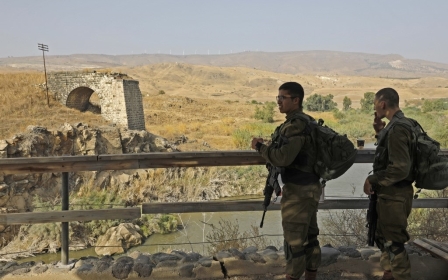Israeli press review: Netanyahu's son says his father made Israel's economy

From oranges to riches: Dad did it
He's already said Palestine does not exist because there is no letter “P” in Arabic. He's used the word “F***” to insult Turkey. Now Benjamin Netanyahu's son has weighed in on his father's role as the longest-serving prime minister in Israeli history.
During a meeting this week in the US, Yair Netanyahu said his father was the one who transformed Israel’s economy from a primitive one, whose only exports were oranges, to the thriving economy it is today, Haaretz reported.
Yair said that Netanyahu, who served as finance minister between 2003 and 2005, took a state that was in a "terrible financial situation" in the 1990s and changed it into a thriving, capitalist marketplace. "Now, Israel’s GDP per capita is higher than Japan’s," he was quoted as saying.
But Haaretz's Merav Arlozorov, commenting on Yair Netanyahu's comments, said apart from his decision to invest in the communities of Palestinian citizens of Israel, the prime minister "has not made any important move to accelerate the economy - and Israel's economic decline is already on the horizon".
New MEE newsletter: Jerusalem Dispatch
Sign up to get the latest insights and analysis on Israel-Palestine, alongside Turkey Unpacked and other MEE newsletters
More Israeli-born children arrested in Tel Aviv
Two Indian families and another from Nigeria were swept up this week in a wave of arrests of foreign workers by Israeli police in Tel Aviv, Ha-Makom news site reported.
One of the Indian couples, Tina and Minin Lopez, came to Israel 12 years ago to work as nurses and have since had two daughters, one seven-year-old and a one-year-old.
Israel’s immigration police also arrested a woman, named by Ha-Makom only as Maria, who had moved from India to work in Israel. Ha-Makom reported that the police may arrest her son, Meron, 12, from his school in Tel Aviv’s Givatayim neighbourhood.
The Nigerian family was also arrested in Tel Aviv, but no further details were reported about them.
Attorney David Tadmor, who represents the Lopez family, said that instead of following court guidelines, Israeli authorities continued "even more strongly in its bullying activities".
“They are not allowed to detain children at all [according to the court’s guidelines], nor are they allowed to issue deportation orders for them or their families," Tadmor said.
The arrests come after an appeals court ordered the release this week of two Israeli-born Filipino children - 13-year-old Gena Antigo and 10-year-old Ralph Harel - who had been arrested on their way to school.
The court ruled that their arrests, and the decision to deport them with their mothers, were flawed because the children's welfare had not been considered.
Landmark EU ruling expected on labelling of settlement goods
The European Union's top court is expected to issue a decision next week that would require products made in illegal Israeli settlements to be clearly labelled as such when sold in Europe.
The EU's Court of Justice is set to make a ruling on 12 November in a case involving Israel's Psagot Winery, with vineyards and factories located in the illegal settlement of Psagot, near Ramallah in the West Bank. Israeli settlements are illegal under international law.
In 2015, the EU issued a notice requiring goods made in Israeli settlements to be clearly labelled, not marked broadly as "Made in Israel".
The following year, the French government issued a regulation requiring the labelling; and Psagot Winery and a pro-Israel advocacy group appealed that decision, which was then referred on to the EU's Court of Justice.
The court's ruling will be final and legally binding on all EU member states.
* Israeli press review is a digest of reports that are not independently verified as accurate by Middle East Eye.
Middle East Eye delivers independent and unrivalled coverage and analysis of the Middle East, North Africa and beyond. To learn more about republishing this content and the associated fees, please fill out this form. More about MEE can be found here.




